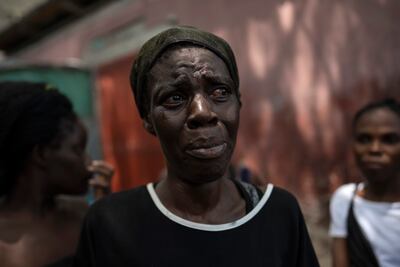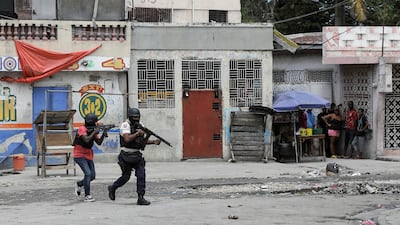UN Secretary General Antonio Guterres on Thursday appealed to the Security Council to create a multinational force to assist Haitian police in restoring peace to the country.
“We are not calling for a military or political mission of the United Nations,” Mr Guterres told reporters at UN headquarters.
“We are calling for a robust security force deployed by member states to work hand in hand with the Haitian National Police to defeat and dismantle the gangs and restore security across the country.”
Powerful gangs have established control over about 80 per cent of Port-au-Prince, taking advantage of insecurity following years of political and economic upheaval.
The gangs block roads, control access to food and health care, and undermine humanitarian support as they terrorise the population.
The UN chief, who visited gang-ravaged Haiti on Saturday, said Haitians are “trapped in a living nightmare”.
“Predatory gangs are using kidnappings and sexual violence as weapons to terrorise entire communities,” Mr Guterres said.

“I have heard appalling accounts of women and girls being gang-raped, and of people being burnt alive.”
As world leaders face increasing pressure to fulfil the request made in October by Haitian Prime Minister Ariel Henry for the deployment of a foreign armed force, Mr Guterres called on the international community to “step up”.
Up to now, the Security Council has only authorised sanctions against gang members and prominent individuals suspected of aiding the gangs.
Following Mr Guterres’s remarks, US ambassador to the UN Jeff DeLaurentis told the Security Council in a briefing on Haiti that Washington supports the deployment of a multinational force to help Haitian police.
Due to inadequate funding and limited resources, police are facing challenges in combating the escalating violence. With about 13,000 active-duty officers serving a population of more than 11 million, the Haitian security force is stretched thin.
William O'Neill, the UN independent expert for Haiti, recently wrapped up a 10-day visit to the country and shared his findings with reporters in New York on Wednesday.
Mr O’Neill’s assessment indicated that Haiti requires between 1,000 and 2,000 international police officers who possess specialised skills in dealing with organised criminal groups, illicit financial operations, kidnapping and urban operations.
Following a rebellion that led to the removal and exile of then-president Jean-Bertrand Aristide in 2004, UN peacekeepers were sent to Haiti. They later withdrew in 2017 and were replaced by UN police, who left in 2019.
Haitians are wary of having an armed UN presence due to past incidents.
In the autumn of 2010, a cholera outbreak killed thousands of people. Experts determined UN peacekeepers who were sent there after a devastating earthquake inadvertently introduced the disease by disposing of infected sewage in a river.



